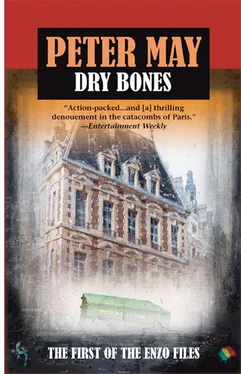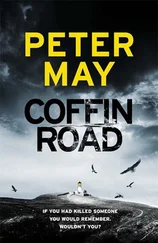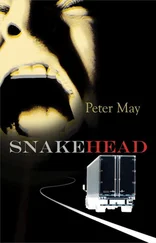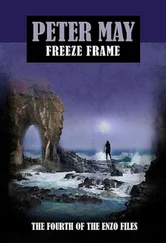Enzo struck something solid. Metal on metal. Both men stopped digging, and Enzo told Raffin to step back. The journalist moved away from the open grave, his neatly coiffured hair falling across a face smeared now with dirt. The gardener stepped forward to take a closer look as Enzo began working more carefully to scrape the earth away from around the lid of a battered, military-green tin trunk. It was just like the others. When, finally, he had removed all the dirt from around the latches, he stepped out of the hole to take a pair of latex gloves from his satchel. He snapped them on and crouched over the trunk again. Carefully, he released the catches and opened the lid. Rusted hinges protested loudly. A fusty, damp smell rose to greet him, and he recoiled with disgust. ‘Jesus….’ The others crowded around to look. The skeletal remains of two legs were folded back at the knee and tied loosely together with plastic twine. The bones were yellow and stained, but undamaged, every tiny metatarsal in the feet preserved intact.
Enzo heard Charlotte gasp. And the gardener said, ‘What the hell is that?’
‘It’s a man’s legs,’ Enzo said. But they were not alone in the trunk. As before, there were another five items. Without looking up he said to Raffin, ‘Get my digital camera out of my bag, Roger.’ The journalist retrieved the camera and handed it to Enzo. Enzo said, ‘We have to be very careful. Don’t want anyone accusing us of contaminating the evidence.’
One by one he lifted the items out to place, singly, on the lid of the trunk and photograph them. There was a brooch, in the shape of a salamander, studded with precious and semi-precious stones. A large gold pendant made in the image of a lion’s head. A lapel pin flag with three vertical stripes of colour — green at the hoist side, yellow and red — a small, green, five-pointed star centred in the yellow band. A replica of a trophy, like a sports cup, with a lid and two large ear-shaped handles. It was engraved with the date 1996 . The final item was what appeared to be a referee’s whistle, attached to a neck cord. There were three faint numbers, divided by an oblique, scratched into the metal plating: 19/3 .
Enzo replaced each item in the trunk where it had lain and looked up at the faces around him. ‘We’re going to have to tell the gendarmes .’
The old retainer who had first greeted them on their arrival walked with them now from the house across the uneven cobbles of the courtyard. He seemed older than just three hours ago. As if one death hadn’t been enough! He had served the family for more than forty years, he told them. He had known three generations of d’Hautvillers. And now they were gone. He had outlived them all, and it would fall to Hugues’ first cousin to carry on the line.
‘He was a very bright young man,’ he said of Hugues. ‘Too bright, really. They say the star that burns twice as bright burns half as long. But his light burned out when his parents died. He was an only child, you see. And his only raison d’être seemed to be gaining the approval of his parents. He did everything to please them. It broke his heart when they sent him to military lycée in Paris, the Pritanée Militaire de la Flèche. He was a gifted child, and it was a gift that required nurture. I think he understood that to achieve his full potential he had to go to Paris. But it was probably reason enough that it pleased his parents. All the same, it distressed him to be away from them.’
They crossed the bridge and turned west, past a couple of gendarmes and several unmarked police vehicles, and followed the moat along to the gate.
‘Of course, you know that he had a brilliant career ahead of him in the Conseil d’État.’
Enzo felt guilty that they had kept up the pretence of knowing the young Hugues.
‘But when news reached him of the death of his parents in that dreadful car crash, he simply bought himself out and came back here to mourn. Seven years of solitude.’ The old man shook his head. ‘He was not interested in company, or in travelling. Occasional trips to Paris to deal with legal and financial affairs. But he spent most of his time locked away in the library reading. Endlessly reading. Or walking the estate. He would be gone for hours on cold winter days, striding over the hills. Didn’t even keep a dog. Wouldn’t have one after…well, you know. Said no dog could ever serve him so well as Utopique.’
When they reached the gate, Enzo could see crime scene tape fluttering in the breeze up along the treeline, and a scribble of blue and pink where a group of gendarmes stood waiting. That was when they heard the first distant drone of the helicopter, thrumming rotors beating warm air as it dropped altitude over the vineyards at the end of its short flight from Paris.
The old man gazed up into the clear sky, searching for a first sight of it. When, finally, he saw it, he seemed disappointed and turned away. Enzo walked with him, and Raffin and Charlotte followed. He drifted along the edge of the moat, staring gloomily into its stillness. ‘You’ve no idea why he did it?’ Enzo asked.
‘Why he killed himself?’ The old man shook his head. ‘None. If he’d been going to do something like that, I’d have thought it would have been after his parents died.’ He lifted his arms, then let them fall again to his sides, as if signalling the futility of ever trying to understand what moved men to do what they did.
‘Had he been depressed recently?’ Charlotte asked.
‘He was a very melancholy young man. He was only thirty-six. But, of course, you know that. Hardly old enough to be carrying the weight of the world on his shoulders. But he always seemed to.’ The old family retainer stopped to remember, and Enzo reflected that he must have known Hugues from cradle to coffin. ‘Not depressed, as such,’ the old man said suddenly. He searched for the right word. ‘Agitated. Yes, I’d say he was agitated these last days. Spent more time in bed than usual. Wasn’t eating properly. Drinking far too much. But, then, that had become something of a habit.’
The distant beat of the helicopter had become a roar, and they turned to look as it swooped down, slowing abruptly and then settling itself gently on the grass. Its near side door swung open and Juge Lelong climbed out, aided by a uniformed officer of the Police Nationale. A third, plainclothes officer, followed. The judge spotted Enzo. He ducked and hurried out from beneath the rotors, before straightening up and running a hand back through ruffled hair. His suit was creased from the flight, and he tried to tug a little style back into its skewed lines. He strode purposefully towards Enzo and the others, his minions trotting in his wake like well-trained dogs. Behind him, the helicopter pilot cut its motors, and the blades slowed with a descending whine. Enzo knew that the judge was not going to be pleased with him.
Juge Lelong stopped in front of Enzo and lit a cigar, blowing smoke into the hot afternoon air. ‘You’re a persistent man.’
‘So I’ve been told.’
‘You were told ,’ said the judge, ‘to keep your sticky little fingers out of the honey pot. But you just couldn’t resist, could you?’
‘As far as I’m aware, we don’t live in a police state. Yet.’
The judge delivered a long look of withering contempt. ‘You’re an amateur, Macleod. And I think the Garde des Sceaux made it perfectly clear that you were to leave matters to the professionals.’
‘If we were to wait for the professionals to get a result, we’d all be picking up our pensions,’ Raffin said.
Juge Lelong swung his head slowly to encompass Raffin within his glare. ‘And who are you?’
Читать дальше












